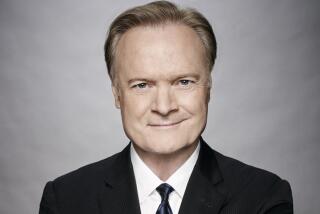Season’s End--Fallout From Ratings Flip-Flop
- Share via
NEW YORK — It’s going to be another bad week at Black Rock.
Bad news hasn’t been a stranger in the CBS corporate offices this past year, and when the final prime-time ratings for this television season are released Tuesday, the network will be sitting in the cellar.
It’s been a fall from the top in a very short time. CBS was first in evening ratings for six seasons before NBC came out on top in 1985. Then CBS was second for two more years to NBC. On Sunday, the end of the official 30-week season, CBS will stand dead last for the first time ever.
The finish is not news, nor will the margin of defeat be a large one. But the end of the season does serve as a landmark for what has been a very bad year for the troubled network.
Season-to-date averages through Wednesday showed NBC easily ahead with a 16 rating, followed by ABC’s 13.8, with CBS only three-tenths of a point behind. Each ratings point represents 886,000 households.
Last week, CBS tied NBC for first place, thanks in part to healthy Nielsens for CBS’ prime-time NCAA basketball finals telecast, the seventh most-watched show that week.
It was ironic. ABC’s climb to second in the prime-time ratings averages was helped by its major sports telecasts this season--the World Series, the Super Bowl and particularly the Winter Olympics, on which ABC lost $65 million.
But ABC has more to crow about than its sports programming. After developing only one successful series last season (“Head of the Class”), the network has come up with at least three strong performers this year, “thirtysomething,” “The Wonder Years” and “Hooperman.” People in the industry are talking about the new Now Network.
Is ABC’s upward mobility a trend? Will CBS be kept in the cellar for years to come? What effect will the programming changes have on the advertising revenues of the networks? The stakes are very high in an era when diminishing audiences for network TV have instigated more frugal management at the corporate level.
The men with the highest profiles in this fight are the three heads of entertainment programming: Brandon Tartikoff at NBC, Brandon Stoddard at ABC and CBS’ Kim LeMasters. They are the decision makers--the men who decide what shows are developed and bought and where they are scheduled. But they are also executives working for corporate masters who believe in the lean-and-mean approach.
All three networks are now run by new, cost-conscious managements--particularly CBS, where, as part of President Laurence Tisch’s continuing effort to cut costs, 700 staffers who are 55 or older are being offered early retirement.
The new managements all have said they’ll continue to spend whatever it takes to get good shows on the air. But they now seem less willing to pay the high salaries of “name” stars they want for series.
During the networks’ program development presentations in March, says John Sisk of the giant ad agency J. Walter Thompson, “there seemed a trend, which was a very subtle thing, but a continuation of the accent on (financial) efficiency” at the networks.
“We did not see a lot of big-name stars as we did the year before . . . and we saw a lot of indications of Canadian production.” (Production costs are lower in Canada.)
Despite CBS’ third-place finish in prime-time averages and ABC’s second-place finale, the two, from a standpoint of profitability, are “pretty much in the same position. . . . They’re in spitting distance of each other,” says Peter Appert, a media analyst at the New York investment firm of Cyrus J. Lawrence. He pegs that as in the range of $50 million-$60 million.
However, Appert thinks “ABC is the network to watch, from a ratings standpoint” next season. He bases this on a recent briefing given security analysts here by Capital Cities/ABC Board Chairman Thomas Murphy and company President Daniel Burke. Their optimism struck him as uncharacteristic, he says.
The two, who brought Cap Cities’ keep-it-lean style to ABC in taking over the latter in 1986, “do not go out on a limb,” Appert says. “In fact, they rarely make any promises. And generally they deliver more than what you expect.” For that reason, he says, he was surprised when they told security analysts that Cap Cities/ABC, “was very optimistic about its own prime-time ratings outlook for this fall. Now, when Cap Cities’ senior management says these things, you take note. Because they’re not given to hyperbole, not given to boasting or making promises that are unfulfillable.”
A prime-time ratings point over a year’s time has been estimated to be worth $100 million in advertising revenue. That is why NBC, for example, so loves Bill Cosby, whose “The Cosby Show” persistently leads the Nielsen derby.
Still, despite the annual end-of-season headlines over which network was No. 1, 2 and 3, advertising agencies say they don’t much care about the standings.
Those results only refer to what they call “total households.”
“It has no importance to us whatsoever,” says J. Walter Thompson’s Sisk. “We don’t buy networks. We buy programs.”
Paul J. Isaccson, executive vice president of the ad agency Young & Rubicam, referring to those who write about TV, puts it this way: “Nobody buys households except you guys.”
David Poltrack, CBS’ vice president for research and marketing, agrees, but with a qualification: The image fostered by being first can indirectly affect advertiser spending.
“If you are the No. 1 network, as is the case with NBC, advertisers want to be associated with No. 1,” he says. “There’s a positive factor involved in that. People give a greater probability of success to your new shows because they are surrounded by hits. . . .
“In the case of being No. 2 or 3--as close at it was this year, it probably would not have been relevant except for the fact it was the first time CBS was third, and therefore it became a news story.”
What the ad agencies look for in the nightly Nielsens is how shows and schedules did in demographic ratings that break viewing habits down by age and sex, showing who was watching, not simply how many. True bliss is a lot of viewers aged 18 to 49, particularly women--because advertisers believe people in this age bracket tend to have more money to spend than others and tend to be more receptive to trying new products they see advertised on TV.
ABC was second last year in the Great 18-to-49 Race, behind NBC. It has run a strong second again this season.
Some observers have chided CBS for keeping series on the air at great length, series such as “Dallas,” now in its 10th year, and “Falcon Crest,” aged seven. However, it’s nothing unusual.
“They (CBS) keep shows on the air generally longer than the other two networks,” notes Mel Conner, a senior vice president at the ad agency Saatchi & Saatchi DFS Compton. “ ‘Gunsmoke’ was so old it was creaking when they finally took it away after some 20 years.”
But he laughs in discussing a recent headline that said: “CBS Tries to Shed Stodgy Image in Prime Time--But Can It Be Hip?”
“You could have picked that headline out and put it in the paper 10 or 20 years ago,” he says. And, speaking only partly in jest, he adds: “In time, maybe things will go with them because . . . the audience grows older.”
CBS’s Poltrack thinks this aging could work out just fine for CBS. “The baby boomers, who are the bulk of the population, have now passed their 35th birthday,” he says. “And the leading edge has moved into their 40s.”
But ABC--and NBC--still have the younger folks, and that’s what advertisers like, even if a new old-codger generation is rapidly growing. What can CBS do?
Get family-appeal shows at 8 p.m., Poltrack says: “It isn’t a question of going after young adults. It’s a question of going after the middle range, 30- to 50-year-old parents and their children simultaneously at 8 o’clock.
“Kids see something they like, they’ll watch it with their parents, and that’s what they’re doing with shows like (NBC’s) ‘Cosby’ and ‘Alf’ . . . and that’s what we need.”
LeMasters, a 38-year-old baby boomer who became CBS’ chief programmer in October when B. Donald (Bud) Grant left that post after seven years, fully concurs.
“We’ve got to take a smart pill to figure out what 8 to 9 o’clock is about,” says LeMasters, who this fall faces his first full season as CBS’ entertainment boss.
Comedy historically has worked there, he notes, but so have other genres, the latest being the network’s own “Beauty and the Beast.”
“We are going to try to attract more kids and teens and young adults to our schedule, but at the same time try not to alienate our core audience, which tends to be older,” he says. “You cannot succeed on just adults, or just kids. You need both.”
Veterans of network programming wars past are not convinced that ABC is now on a roll. Nor is it a safe bet, they say, that CBS is headed for the tank, even though its highest-rated new series this season, “Beauty and the Beast,” ranks 50th among the 104 network series that have aired.
The vets include Grant Tinker, who in the five years he ran NBC patiently guided it from limbo to limelight in both ratings and critical acclaim before leaving in 1986 to return to independent production in Hollywood. Noting that there have been “negative comments” about CBS in recent New York Times and Wall Street Journal stories--including some from him--he says all is not lost at that network, not by a long shot.
“I really think there was a lot more doom-saying about CBS than there should be at this point,” says Tinker, head of GTG Entertainment. “I think they’re far from being counted out.”
(It may help that his company is making three sitcom and one dramatic series pilots for CBS. But under his CBS deal, he can try elsewhere with a show if CBS passes; that’s why ABC also has a Tinker-made show afoot.)
Fred Silverman is another man who knows about programming wars. He was Tinker’s predecessor at NBC in the years when that network really was in the Nielsen cellar and is equally sympathetic to CBS, where he once was head of programming (a job he also held at ABC).
“Superficially, they’ve (ABC) overtaken CBS, but I think anybody who looks at the ratings knows that the Olympics and the Super Bowl certainly had something to do with that,” says Silverman, now a producer. “If you look at the regularly scheduled series, that isn’t the case. And they (CBS) cut back on movie nights; if they hadn’t cut the Tuesday night movie, it would have been no contest. I would venture to say that between now and the May sweeps, you may see CBS regularly in second place.”
According to CBS researcher Poltrack, if only regularly scheduled programs (series and movie nights) are counted, the season-to-date ratings are NBC 16.2, CBS 13.6 and ABC 12.9.
Silverman adds, “I think the press is by and large being rather cruel to CBS. CBS is in better shape than they’re giving them credit for. CBS is still winning Sunday night, which is the most important night of the week; they’re still winning Friday night and, as this season plays out, they have a very, very good shot at winning Wednesday night. I don’t think they’re by any means terminal, and there appears to be a feeding frenzy.”
Even Ted Harbert, ABC’s vice president for prime-time programs, decries--sort of--press criticism of LeMasters for CBS’ state of prime-time affairs: “He has been really mercilessly attacked, and I don’t think it’s fair. . . . He inherited a (program) schedule that was getting old.”
Next season is the big unknown in the battle.
The advertising community, which heard pilot presentations from the networks in Los Angeles in March, won’t see the fall schedules and new programs until May and June.
But a program development report by one ad agency, FCB/Telecom, shows that ABC lists pilots for 13 sitcoms, one variety show and 15 dramas, and adds that the network is “definitely aiming for the younger demographic breaks.”
ABC won’t have the major sportscasts of this season, but it will start airing its $100-million “War and Remembrance” miniseries early next year. Nevertheless, the network seems “to be emphasizing the need for regular series performance,” the report says. (ABC has signed a 10-project development deal with Steven Bochco, co-creator of “Hill Street Blues,” “L.A. Law” and “Hooperman.”)
“If they succeed,” FCB/Telcom says, “they could be solidly in second place by this time next year.”
NBC, the report says, has 33 new development projects, including 16 comedies and 17 dramas, with six sitcoms already approved. NBC will continue to dominate prime time, it says.
As for CBS, the report says the network has 37 series in development, 21 of them comedies, the balance dramas. It makes no call on whether CBS will regain second but adds that around CBS nowadays, “there’s a feeling of near desperation.”
So, do CBS’ much-publicized program troubles mean that those problems will worsen, and that ABC will be an even stronger No. 2 next season?
“I would be a professional fool to answer that question,” says Isaccson of Young & Rubicam. “Call me in August.”
“Honest to God, if anybody tells you anything other than ‘I don’t know,’ they’re kidding you,” says Sisk of J. Walter Thompson.
“We are encouraged by some of our new programs’ performance, and hopeful,” says John B. Sias, ABC’s network president. “But we are making no predictions at this time. It’s premature.”
More to Read
The biggest entertainment stories
Get our big stories about Hollywood, film, television, music, arts, culture and more right in your inbox as soon as they publish.
You may occasionally receive promotional content from the Los Angeles Times.










